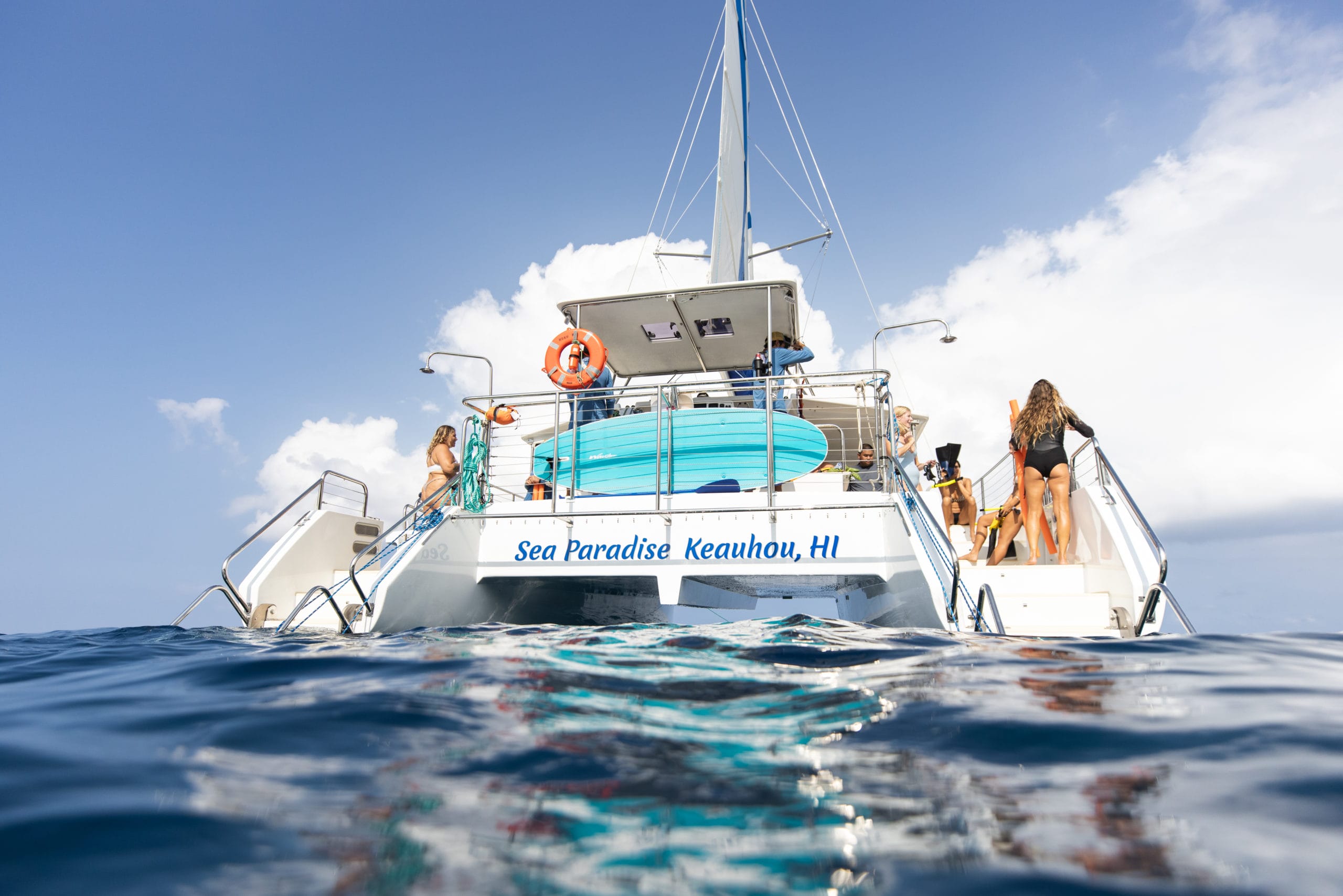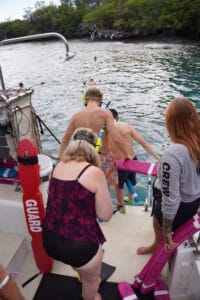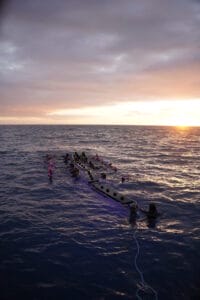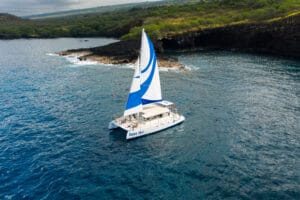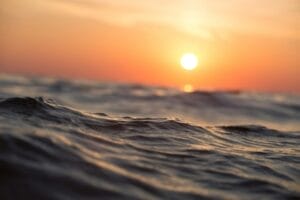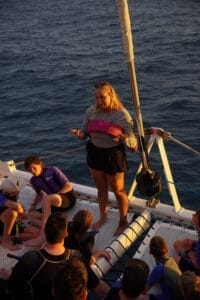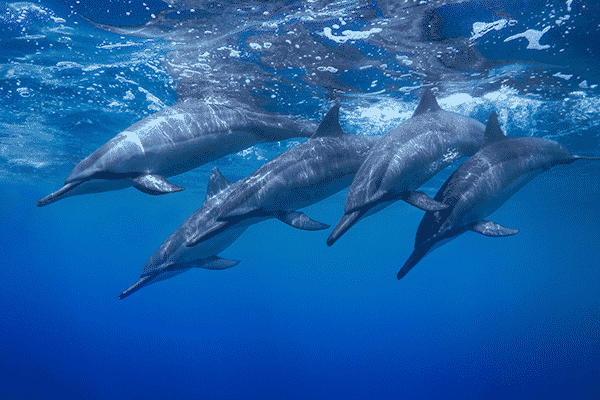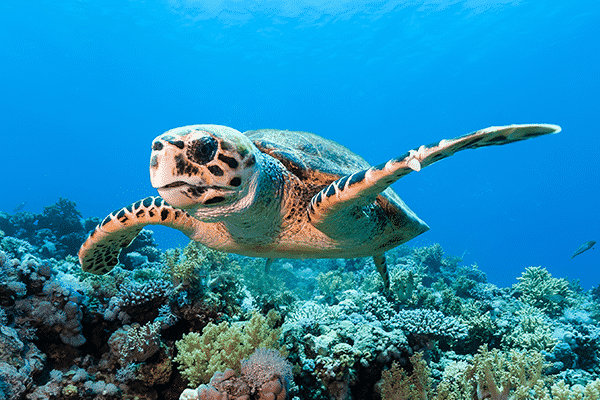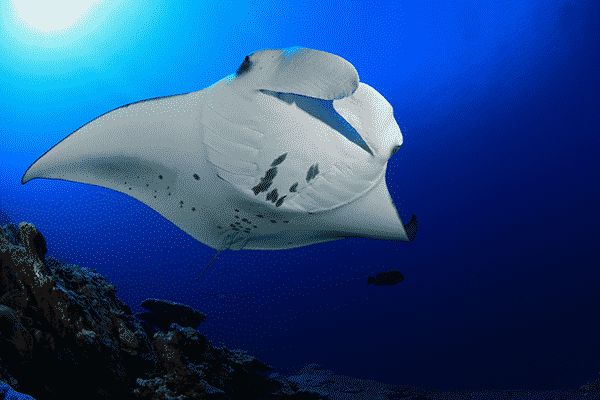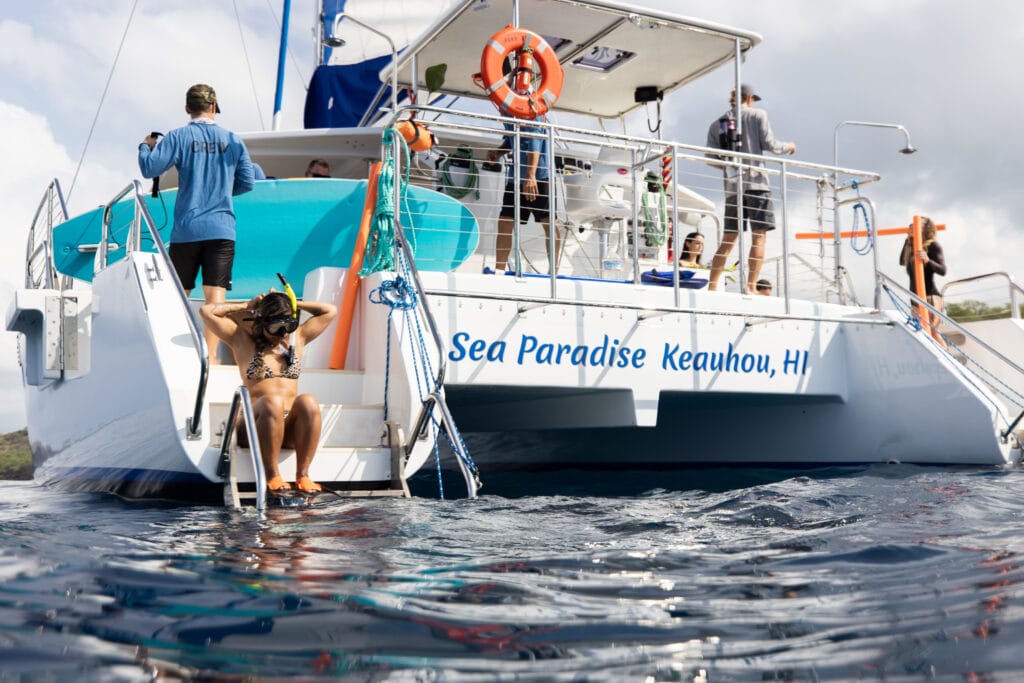Here’s an interesting post from Sheridan Rhodes for Stuff on helpful things to know for first-time visitors to Hawaii. Join us on the Hoku Nui for a snorkel or manta ray tour. Sail out with our excellent crew to your snorkel adventure. This is a great way to see the beautiful coast of Kona and have a bucket list experience you’ll treasure forever.
If you think Hawaii is all about floral shirts, mai tais, hula girls and ukuleles, you’re in for quite a surprise. Sure, you’ll find these things. However, the Aloha State offers much more for the first-time visitor, particularly if you venture beyond the main island of Oahu to Hawaii’s rich, diverse and remarkably uncommercialised neighbouring islands.
They don’t all wear Hawaiian shirts, and actually they’re not called that
I know, right? I naively thought I’d see every man wearing the type of loud floral shirts that are often retrieved from the back of the wardrobe for fancy dress parties. Granted you will see many people, including locals, wearing floral shirts, and in fact the vintage ones are making a comeback. The tacky ones? They’re typically worn by tourists. Oh, and they’re not called Hawaiian shirts; they’re aloha shirts.
We have Hawaii to thank for casual Friday
Back in the ’40s employees were given permission to wear sports shirts, instead of a suit and tie during Hawaii’s hottest months. In the ’60s a clothing manufacturers’ group launched a campaign to institute Aloha Friday. But the trend didn’t take off until Wilson P. Cannon, a Maui boy, wore aloha shirts to the office for his job as Bank of Hawaii president in 1966. The concept – casual Friday as we know it in Australia – spread to mainland US and later around the world. These days aloha shirts (locals prefer to wear the smart Tori Richard or Sig Zane designed ones) are perfectly acceptable attire in the workplace and no one would be seen dead in a suit.
Aloha is a way of life
Speaking of aloha, in Hawaii it’s much more than just a word for hello and goodbye. Aloha is a way of life that Hawaii locals live every day – an attitude that is friendly, welcoming and compassionate. Those who live aloha share this with friends, family and visitors alike and it’s one of the things that makes Hawaii so special.
Spam never went out of fashion
You know that jelly encased pre-cooked pork that was popular in the ’70s – ham in a can known as Spam? Well, blow me down it’s alive and well in Hawaii. Hawaiians consume the most Spam out of any US state – more than 7 million tins a year. You will see many different flavours in the supermarkets, McDonald’s and Burger King serve it, there’s Spam sushi and even a festival devoted entirely to the “Hawaiian steak” – Spam Jam Festival. See www.spamjamhawaii.com
The alphabet has just 13 letters
There are only 13 letters in the Hawaiian alphabet – five vowels (long and short) and eight consonants, one of them being the okina, a letter which represents the glottal stop (or a slight pause). If you want to learn more, Aulani, a Disney resort on Oahu, has a lounge that celebrates the Hawaiian language. The decor in the Olelo Room (pronounced oh-leh-low; Hawaiian for “word,” or “to converse”) features wooden carvings of common objects, with labels that convey their Hawaiian names.
Bartenders are also more than happy to help you refine your pronunciation of Hawaiian words. It’s your chance to work on pronouncing humuhumunukunukuapuaa (Hawaii’s national fish). Try saying that with a few mai tais under your belt!
Not everyone’s Hawaiian
Only people with native Hawaiian ancestry are called “Hawaiians”. Hawaiian is a race of people. No matter how old you are or how long you’ve lived in the state, people of non-Hawaiian ancestry – even those born and raised there – call themselves “locals”, or Kamaaina.
Follow the laws of the lei
There is a right and wrong way to give and receive the famous Hawaiian lei (floral garland) and “lei etiquette” is taken seriously in Hawaii. For example, a person should never place a lei over their own head – this is always bestowed by the greeter, often with a kiss to each cheek. A lei should be draped across the shoulders rather than around the neck. It’s disrespectful to refuse a lei, you can wear a lei more than once and you don’t need a special occasion to wear one. Each Hawaiian Island also has its own traditional lei, “lei” is both singular and plural, May 1 is the official Lei Day and lei are traditionally made from fresh flowers, ti leaf, kukui nuts or shells. When a lei’s flowers start to wilt, the lei should be placed in the garden so it can return to the earth – never thrown in the bin.
Easy sunshine; one drink at a time
Before you go lining up your shots at the bar, you should be aware that by law in Hawaii, you may only have one alcoholic drink in front of you at a time.
You’ll say aloha and mahalo just like a local
The Hawaiian language is very much a part of modern Hawaii and many words are used in the everyday vernacular of the locals. Visitors will often hear locals using words and phrases such as “aloha” (hello and bye); “mahalo” (thank you; “kokua” (help); “keiki” (children); “slippas” (flip-flops or thongs); “ohana” (family); “A hui hou” (until we meet again); “kama aina” (literally meaning “child of the land” and referring to anyone who is from Hawaii but is not of native Hawaiian descent. Many stores and restaurants offer “kamaaina” (discounts for locals). Within a day of arriving you’ll be saying aloha and mahalo like a local!
The Hawaiian pizza isn’t actually from Hawaii
Amazingly the Hawaiian pizza that we’re all familiar with in Australia was created in the 1960s by a Greek Canadian for his pizzeria in Ontario. A “real” Hawaiian pizza is more likely to include local ingredients such as kahlua pork (a slow-cooked smoked pork that is a Hawaiian specialty), taro, poke (fresh raw ahi tuna) and even Spam. Local versions can be found across the islands. However, Flatbread at Paia on Maui does a ripper version.
It’s where things went pear shaped for Captain Cook
It’s where things went pear shaped for Captain Cook
In Kealakekua Bay on Hawaii Island Captain James Cook met his fate on February 14, 1779, after a skirmish with native Hawaiians. A 527-square-metre area was deeded to England for a monument to the famous navigator, including a white obelisk on the shore of the bay.
There’s quite a lot of lava in Hawaii, but no need to run
There are five volcanoes on the Island of Hawaii, three of which are active – including Kilauea, one of the world’s largest and most active. It’s been erupting constantly since 1983. You can see the volcanoes at Hawaii Volcanoes National Park, and also by helicopter or lava boat tour. To watch lava flowing into the sea is a phenomenal sight.
Walking on the moon
In the 1960s, astronauts trained for moon voyages by walking on Mauna Loa’s hardened (and cooled) lava fields. Here eroded lava deposits turned to a fine powder, resemble the top layers of lunar dust. The astronauts collected surface samples and tested out the lunar buggy. NASA still uses Hawaii as staging grounds for tests of space vehicles travelling to the moon or Mars. Some tests involve extracting oxygen from volcanic basalt, as this would mean not having to lug huge supplies of it from Earth.
It also snows
During the winter months, it’s common to find snow on top of Mauna Kea and Mauna Loa volcanoes on the Island of Hawaii. Mauna Loa is also the tallest mountain in the world when measured from the ocean floor rising to more than 10,000 metres – significantly higher than Mount Everest at 8848 metres above sea level.
Dozens of movies and TV shows were filmed here
Some of the most famous include Elvis Presley’s Blue Hawaii; From Here to Eternity; Jurassic Park; 50 First Dates; Godzilla; The Descendants; Hawaii Five-0; Magnum PI, Lost, Fantasy Island and parts of the second Hunger Games movie. You can visit and take tours of several of the locations where some of the movies were filmed such as Kualoa Ranch on Oahu and Kipu Ranch on Kauai.
Which way?
When Hawaii locals talk about directions or where they live, they often refer to the “leeward” (dry) side or “windward” (wet) side of their islands, or if they live “kai” (near the ocean) way or “mauna” (near the mountains) way.
Hawaii is the 50th state of the US
Hawaii was the last and 50th state to become part of the United States in 1959 – hence where the name for the famous TV show Hawaii Five-0 originated.
Waikiki beach isn’t all that it’s cracked up to be
When I saw Waikiki Beach for the first time I admit I was a tad disappointed. It’s a long stretch of beach and it’s busy. The sand on the beach outside the hotel I was staying at, the Halekulani, is almost non-existent at high tide. Wider stretches can be found up near the Diamond Head end and near Hilton Hawaiian Village. Having said that, you should still visit Waikiki. It’s fun, there’s always something going on and the walk to the lookout on Diamond Head is well worth it. There are many stunning beaches to be found on Hawaii’s islands, including Makena Beach on Maui, Manele Bay on Lanai and the beautiful Hapuna Beach on the Big Island.
Surfing, the ukulele, hula and Obama all come from here
For a small island state with a population of just 1.4 million, Hawaii has given the world some of its most famous cultural and sporting icons. These include surfing, outrigger canoeing, the ukulele, hula, aloha (Hawaiian) shirts, and the shaka sign (you know, hang loose man). Hawaii is also responsible for the fabulous lomi lomi massage, which has become a popular spa treatment around the world. And Barack Obama was born in Hawaii, and spent his early childhood years there.

